Piano Sheet Music
 "I couldn't believe how good Jimi Hendrix was It was a really difficult thing for me to deal with, but I just had to surrender and say, 'This is fantastic.'" Eric Clapton / Yardbirds / Blues Breakers /Cream / Blind Faith / Derek and the Dominoes
"I couldn't believe how good Jimi Hendrix was It was a really difficult thing for me to deal with, but I just had to surrender and say, 'This is fantastic.'" Eric Clapton / Yardbirds / Blues Breakers /Cream / Blind Faith / Derek and the Dominoes
Frank Sinatra

Francis Albert "Frank" Sinatra (December 12, 1915 â May 14, 1998) was an American singer and actor.
Beginning his musical career in the swing era with Harry James and Tommy Dorsey, Sinatra became a solo artist with great success in the early to mid-1940s, being the idol of the "bobby soxers". His professional career had stalled by the 1950s, but it was reborn in 1954 after he won the Academy Award for Best Supporting Actor.
He signed with Capitol Records and released several critically lauded albums (such as In the Wee Small Hours, Songs for Swingin' Lovers, Come Fly with Me, Only the Lonely and Nice 'n' Easy). Sinatra left Capitol to found his own record label, Reprise Records (finding success with albums such as Ring-A-Ding-Ding, Sinatra at the Sands and Francis Albert Sinatra & Antonio Carlos Jobim), toured internationally, and fraternized with the Rat Pack and President John F. Kennedy in the early 1960s. Sinatra turned 50 in 1965, recorded the retrospective September of My Years, starred in the Emmy-winning television special Frank Sinatra: A Man and His Music, and scored hits with "Strangers in the Night" and "My Way".
Sinatra attempted to weather the changing tastes in popular music, but with dwindling album sales and after appearing in several poorly received films, he retired in 1971. Coming out of retirement in 1973, he recorded several albums, scoring a hit with "(Theme From) New York, New York" in 1980, and toured both within the United States and internationally until a few years before his death in 1998.
Sinatra also forged a career as a dramatic actor, winning the Academy Award for Best Supporting Actor for his performance in From Here to Eternity, and he was nominated for the Academy Award for Best Actor for The Man with the Golden Arm. His also starred in such musicals as High Society, Pal Joey, Guys and Dolls and On the Town. Sinatra was honored with the Kennedy Center Honors in 1983 and awarded the Presidential Medal of Freedom by Ronald Reagan in 1985 and the Congressional Gold Medal in 1997. Sinatra was also the recipient of eleven Grammy Awards, including the Grammy Trustees Award, Grammy Legend Award and the Grammy Lifetime Achievement Award.
Beginning his musical career in the swing era with Harry James and Tommy Dorsey, Sinatra became a solo artist with great success in the early to mid-1940s, being the idol of the "bobby soxers". His professional career had stalled by the 1950s, but it was reborn in 1954 after he won the Academy Award for Best Supporting Actor.
He signed with Capitol Records and released several critically lauded albums (such as In the Wee Small Hours, Songs for Swingin' Lovers, Come Fly with Me, Only the Lonely and Nice 'n' Easy). Sinatra left Capitol to found his own record label, Reprise Records (finding success with albums such as Ring-A-Ding-Ding, Sinatra at the Sands and Francis Albert Sinatra & Antonio Carlos Jobim), toured internationally, and fraternized with the Rat Pack and President John F. Kennedy in the early 1960s. Sinatra turned 50 in 1965, recorded the retrospective September of My Years, starred in the Emmy-winning television special Frank Sinatra: A Man and His Music, and scored hits with "Strangers in the Night" and "My Way".
Sinatra attempted to weather the changing tastes in popular music, but with dwindling album sales and after appearing in several poorly received films, he retired in 1971. Coming out of retirement in 1973, he recorded several albums, scoring a hit with "(Theme From) New York, New York" in 1980, and toured both within the United States and internationally until a few years before his death in 1998.
Sinatra also forged a career as a dramatic actor, winning the Academy Award for Best Supporting Actor for his performance in From Here to Eternity, and he was nominated for the Academy Award for Best Actor for The Man with the Golden Arm. His also starred in such musicals as High Society, Pal Joey, Guys and Dolls and On the Town. Sinatra was honored with the Kennedy Center Honors in 1983 and awarded the Presidential Medal of Freedom by Ronald Reagan in 1985 and the Congressional Gold Medal in 1997. Sinatra was also the recipient of eleven Grammy Awards, including the Grammy Trustees Award, Grammy Legend Award and the Grammy Lifetime Achievement Award.
Guns N' Roses

Guns N 'Roses is an American rock band founded in 1985 in Los Angeles, California. Axl Rose, Slash, Izzy Stradlin, Duff McKagan, and Steven , Genres: Hard rock, Heavy metal, Blues rock, Glam rock They started their music life in Los Angeles, California, USA (1985) Albums: Appetite for Destruction, Use Your Illusion I
Savage Garden

Savage Garden was an Australian pop duo that enjoyed major international success between 1997 and 2000. The band was composed of Darren Hayes (vocals) and Daniel Jones (keyboards, sequencing, and guitar). They had a string of hits in the late nineties, and are best remembered today for their ballad "Truly Madly Deeply", which is considered their signature song, and the songs "To the Moon and Back", "I Knew I Loved You", "Crash and Burn", "I Want You" and "Affirmation".
They had sold over 25 million albums and more than 15 million singles around the world, spent five years in the UK album charts despite only two albums released. They had ten Top 40 chart singles in the UK, nine charted Top 20 and four went Top 10. They also performed "Affirmation" as part of the 2000 Sydney Olympic Closing Ceremony.
They had sold over 25 million albums and more than 15 million singles around the world, spent five years in the UK album charts despite only two albums released. They had ten Top 40 chart singles in the UK, nine charted Top 20 and four went Top 10. They also performed "Affirmation" as part of the 2000 Sydney Olympic Closing Ceremony.
Alicia Keys

Alicia J. Augello-Cook (born January 25, 1981), and has won numerous awards, including eleven Grammy Awards, seventeen Billboard Music Awards, three American Music Awards.
Her debut album Songs in A Minor was a worldwide success, selling nearly 11 millions albums, and received five Grammy Awards in 2002, with Alicia winning Best New Artist and also Song of the Year for "Fallin'".
Her debut album Songs in A Minor was a worldwide success, selling nearly 11 millions albums, and received five Grammy Awards in 2002, with Alicia winning Best New Artist and also Song of the Year for "Fallin'".
A.Kastalsky

Alexandr Dmitriyevich Kastalsky was a Russian composer and folklorist. Kastalsky was born in Moscow to protoiereus Dmitri Ivanovich Kastalsky. He studied music theory, composition and the piano at the Moscow Conservatory.
Beethoven

Ludwig van Beethoven (16 December 1770 - 26 March 1827) was a German composer and pianist. He was a crucial figure in the transitional period between the Classical and Romantic eras in Western classical music, and remains one of the most respected and influential composers of all time.
Born in Bonn, then in the Electorate of Cologne (now in modern-day Germany), he moved to Vienna in his early twenties and settled there, studying with Joseph Haydn and quickly gaining a reputation as a virtuoso pianist. Beethoven's hearing gradually deteriorated beginning in his twenties, yet he continued to compose masterpieces, and to conduct and perform, even after he was completely deaf.
Born in Bonn, then in the Electorate of Cologne (now in modern-day Germany), he moved to Vienna in his early twenties and settled there, studying with Joseph Haydn and quickly gaining a reputation as a virtuoso pianist. Beethoven's hearing gradually deteriorated beginning in his twenties, yet he continued to compose masterpieces, and to conduct and perform, even after he was completely deaf.
Linkin Park

Linkin Park is an American rock band from Agoura Hills, California. Since their formation in 1996, the band has sold more than 50 million albums and won two Grammy Awards. They achieved mainstream success with their debut album, Hybrid Theory, which was certified Diamond by the RIAA in 2005. Their following studio album, Meteora, continued the band's success, topping the Billboard 200’s album charts in 2003, and was followed by extensive touring and charity work around the world.
Recognized for their adaptation of the nu metal and rap rock genre into a radio-friendly yet densely-layered style in Hybrid Theory and Meteora, the band moved away from this and explored a variety of other genres in their latest studio album, Minutes to Midnight. The album topped the Billboard charts and had the third best debut week of any album that year. They are also known for their several collaborations, most notably with rapper Jay-Z in their mash-up album Collision Course, and many other artists on Reanimation.
Recognized for their adaptation of the nu metal and rap rock genre into a radio-friendly yet densely-layered style in Hybrid Theory and Meteora, the band moved away from this and explored a variety of other genres in their latest studio album, Minutes to Midnight. The album topped the Billboard charts and had the third best debut week of any album that year. They are also known for their several collaborations, most notably with rapper Jay-Z in their mash-up album Collision Course, and many other artists on Reanimation.
Joseph Martin
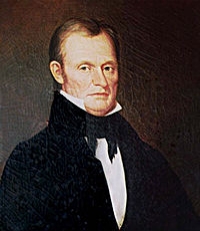
Joseph Martin Kraus (20 June 1756 – 15 December 1792), was a composer in the classical era who was born in Miltenberg am Main, Germany.
Gabriel Faure

Gabriel Urbain Fauré (12 May 1845 – 4 November 1924) was a French composer, organist, pianist, and teacher. He was the foremost French composer of his generation, and his musical style influenced many 20th century composers. His harmonic and melodic language affected how harmony was later taught.
Aaron Parks
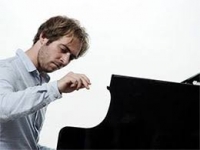
Aaron Parks is a jazz pianist. Date of birth: October 7, 1983 (36 years old), Seattle, Washington, United States
10cc

10cc are an English art rock band who achieved their greatest commercial success in the 1970s. Initially comprising four musicians — Graham Gouldman, Eric Stewart, Kevin Godley and Lol Creme — who had written and recorded together for some three years, before assuming the “10cc” name in 1972.
Two strong song-writing teams, a commercial team and an artistic team, injected sharp wit to lyrically-dextrous songs. The commercial team (Stewart and Gouldman) were straight pop-song-writers, who created the band’s most accessible songs; the artistic team (Godley and Creme) were the experimental half of 10cc, featuring an Art School sensibility and cinematic writing. Each man was a multi-instrumentalist, singer, writer, and producer, and each could perform as the lead singer.
Two strong song-writing teams, a commercial team and an artistic team, injected sharp wit to lyrically-dextrous songs. The commercial team (Stewart and Gouldman) were straight pop-song-writers, who created the band’s most accessible songs; the artistic team (Godley and Creme) were the experimental half of 10cc, featuring an Art School sensibility and cinematic writing. Each man was a multi-instrumentalist, singer, writer, and producer, and each could perform as the lead singer.
Rent

Rent is a rock musical, with music and lyrics by Jonathan Larson based on Giacomo Puccini's opera La Bohème. It tells the story of a group of impoverished young artists and musicians struggling to survive and create in New York's Lower East Side in the thriving days of the Bohemian East Village, under the shadow of AIDS.
Rent won a Tony Award for Best Musical and a Pulitzer Prize, among other awards. In addition, its cast was unusually ethnically diverse. Rent brought controversial topics to a traditionally conservative medium, and it helped to increase the popularity of musical theater amongst the younger generation. "Rent speaks to Generation X the way that the musical Hair spoke to the baby boomers or those who grew up in the 1960s, calling it "a rock opera for our time, a Hair for the 90s."
The musical was first seen at the New York Theatre Workshop in 1994. On January 26, 1996, Rent opened in New York City off-Broadway before moving to Broadway's Nederlander Theatre on April 29, 1996. Rent has been successful on Broadway, where it had critical acclaim and word-of-mouth popularity. The Broadway production of Rent closed on September 7, 2008 after a 12 year run and 5,124 performances, making it the seventh-longest-running Broadway show. The production has grossed over $280 million. At the time of its closing, it was the second-longest-running musical currently on Broadway, eight years behind The Phantom of the Opera.
Rent won a Tony Award for Best Musical and a Pulitzer Prize, among other awards. In addition, its cast was unusually ethnically diverse. Rent brought controversial topics to a traditionally conservative medium, and it helped to increase the popularity of musical theater amongst the younger generation. "Rent speaks to Generation X the way that the musical Hair spoke to the baby boomers or those who grew up in the 1960s, calling it "a rock opera for our time, a Hair for the 90s."
The musical was first seen at the New York Theatre Workshop in 1994. On January 26, 1996, Rent opened in New York City off-Broadway before moving to Broadway's Nederlander Theatre on April 29, 1996. Rent has been successful on Broadway, where it had critical acclaim and word-of-mouth popularity. The Broadway production of Rent closed on September 7, 2008 after a 12 year run and 5,124 performances, making it the seventh-longest-running Broadway show. The production has grossed over $280 million. At the time of its closing, it was the second-longest-running musical currently on Broadway, eight years behind The Phantom of the Opera.
William Finn

William Alan Finn (born February 28, 1952) is an American composer and lyricist of musicals. His musical Falsettos received the 1992 Tony Awards for Best Music and Lyrics and for Best Book.
Jewel

Jewel Kilcher (born May 23, 1974) is an American singer-songwriter, actress, and poet, generally known just by her first name, Jewel. She has received three Grammy Award nominations and has sold over 27 million albums worldwide, and almost 20 million in the United States alone.
Kilcher debuted on February 28, 1995 with the album, Pieces of You, which became one of the best selling debut albums of all time, going platinum twelve times. In her career, she has released several albums, usually switching genres between working on her albums. Her most recent album, Perfectly Clear, her first country record, was released on The Valory Music Co. in 2008. It debuted at #1 on the U.S. Billboard Top Country Albums chart, and has featured two charted country singles, "Stronger Woman" and "I Do". The former peaked at #13, and "I Do" has made the Top 40.
Kilcher debuted on February 28, 1995 with the album, Pieces of You, which became one of the best selling debut albums of all time, going platinum twelve times. In her career, she has released several albums, usually switching genres between working on her albums. Her most recent album, Perfectly Clear, her first country record, was released on The Valory Music Co. in 2008. It debuted at #1 on the U.S. Billboard Top Country Albums chart, and has featured two charted country singles, "Stronger Woman" and "I Do". The former peaked at #13, and "I Do" has made the Top 40.
Evanescence

Evanescence is an American rock band founded in Little Rock, Arkansas in 1995 by singer/pianist Amy Lee and guitarist Ben Moody.
After recording two private EPs and a demo CD named Origin, with the help of Bigwig Enterprises in 2000, the band released their first full-length album, Fallen, on Wind-up Records in 2003. Fallen sold more than 15 million copies worldwide and helped the band win two Grammy Awards. A year later, Evanescence released their first live album, Anywhere but Home, which sold more than one million copies worldwide. In 2006, the band released their second studio album, The Open Door, which has sold more than four million copies.
The band has suffered several line-up changes, including co-founder Moody leaving in 2003, followed by guitarist John LeCompt and drummer Rocky Gray in 2007. Lee is now the only original member of Evanescence remaining in the band.
After recording two private EPs and a demo CD named Origin, with the help of Bigwig Enterprises in 2000, the band released their first full-length album, Fallen, on Wind-up Records in 2003. Fallen sold more than 15 million copies worldwide and helped the band win two Grammy Awards. A year later, Evanescence released their first live album, Anywhere but Home, which sold more than one million copies worldwide. In 2006, the band released their second studio album, The Open Door, which has sold more than four million copies.
The band has suffered several line-up changes, including co-founder Moody leaving in 2003, followed by guitarist John LeCompt and drummer Rocky Gray in 2007. Lee is now the only original member of Evanescence remaining in the band.
Hilary Duff

Hilary Erhard Duff (born September 28, 1987) is an American actress, pop singer-songwriter and entrepreneur. After gaining fame for playing the title role in the television show Lizzie McGuire, Duff went on to have a film career; her most commercially successful movies include Cheaper by the Dozen (2003), The Lizzie McGuire Movie (2003), and A Cinderella Story (2004).
Duff has expanded her repertoire into pop music, with four RIAA certified Platinum albums and over thirteen million albums sold worldwide. Her first studio album, Metamorphosis (2003), was certified triple platinum and she followed it up with two more platinum albums, Hilary Duff (2004) and Most Wanted (2005). Duff's last studio album, Dignity, was released in April 2007 and was certified Gold in August 2007.
She has also launched a clothing line, "Stuff by Hilary Duff", and two exclusive perfume collections with Elizabeth Arden. Duff and her mother were listed as producers for the movie Material Girls, As of August 2008, her upcoming films include animated comedy Foodfight!, and independent films Greta and Safety Glass.
Duff has expanded her repertoire into pop music, with four RIAA certified Platinum albums and over thirteen million albums sold worldwide. Her first studio album, Metamorphosis (2003), was certified triple platinum and she followed it up with two more platinum albums, Hilary Duff (2004) and Most Wanted (2005). Duff's last studio album, Dignity, was released in April 2007 and was certified Gold in August 2007.
She has also launched a clothing line, "Stuff by Hilary Duff", and two exclusive perfume collections with Elizabeth Arden. Duff and her mother were listed as producers for the movie Material Girls, As of August 2008, her upcoming films include animated comedy Foodfight!, and independent films Greta and Safety Glass.
Irving Berlin

Irving Berlin (May 11, 1888 – September 22, 1989) was a Russian-born American composer and lyricist, and one of the most prolific American songwriters in history. Berlin was one of the few Tin Pan Alley/Broadway songwriters who wrote both lyrics and music for his songs. Although he never learned to read music beyond a rudimentary level, with the help of various uncredited musical assistants or collaborators, he eventually composed over 3,000 songs, many of which (e.g. "God Bless America", "White Christmas", "Anything You Can Do", "There's No Business Like Show Business") left an indelible mark on music and culture worldwide. He composed seventeen film scores and twenty-one Broadway scores.
Chopin

Frédéric Chopin (1 March 1810 – 17 October 1849) was a Polish composer and virtuoso pianist of the Romantic period. He is widely regarded as the greatest Polish composer, and ranks as one of music's greatest tone poets.
He was born in the village of Żelazowa Wola, in the Duchy of Warsaw, to a Polish mother and French-expatriate father, and in his early life was regarded as a child-prodigy pianist. In November 1830, at the age of 20, Chopin went abroad; following the suppression of the Polish November Uprising of 1830–31, he became one of many expatriates of the Polish "Great Emigration."
In Paris, he made a comfortable living as a composer and piano teacher, while giving few public performances. A Polish patriot,
Chopin's extant compositions were written primarily for the piano as a solo instrument. Though technically demanding, Chopin's style emphasizes nuance and expressive depth rather than virtuosity. Chopin invented musical forms such as the ballade and was responsible for major innovations in forms such as the piano sonata, waltz, nocturne, étude, impromptu and prelude. His works are mainstays of Romanticism in 19th-century classical music.
He was born in the village of Żelazowa Wola, in the Duchy of Warsaw, to a Polish mother and French-expatriate father, and in his early life was regarded as a child-prodigy pianist. In November 1830, at the age of 20, Chopin went abroad; following the suppression of the Polish November Uprising of 1830–31, he became one of many expatriates of the Polish "Great Emigration."
In Paris, he made a comfortable living as a composer and piano teacher, while giving few public performances. A Polish patriot,
Chopin's extant compositions were written primarily for the piano as a solo instrument. Though technically demanding, Chopin's style emphasizes nuance and expressive depth rather than virtuosity. Chopin invented musical forms such as the ballade and was responsible for major innovations in forms such as the piano sonata, waltz, nocturne, étude, impromptu and prelude. His works are mainstays of Romanticism in 19th-century classical music.
Missy Higgins

Missy Higgins (born Melissa Morrison Higgins on August 19, 1983) is an award-winning Australian singer-songwriter, best known for the hit singles "Scar", "The Special Two" and "Steer". Her second album, On a Clear Night, was released in April 2007.
Paul Hindemith

Paul Hindemith (16 November 1895 – 28 December 1963) was a German composer, violist, violinist, teacher, music theorist and conductor.
K-On!
K-On! (けいおん! Keion!?) is a Japanese four-panel comic strip manga written and illustrated by Kakifly. The manga started serialization in Houbunsha's seinen manga magazine Manga Time Kirara since the May 2007 issue, and also started a bimonthly serialization in Houbunsha's magazine Manga Time Kirara Carat since the October 2008 issue. A thirteen-episode anime adaptation produced by Kyoto Animation aired in Japan between April and June 2009. An additional original video animation episode was released in January 2010. A second season, titled K-On!! (with two exclamation marks), began airing in Japan from April 7, 2010. The title of the series comes from the Japanese word for light music, keiongaku (軽音楽?), but in the Japanese context is similar to pop music.
John Williams

John Towner Williams (born February 8, 1932) is an American composer, conductor, and pianist. In a career that spans six decades, Williams has composed many of the most famous film scores in Hollywood history, including Star Wars, Superman, Home Alone, the first three Harry Potter movies and all but two of Steven Spielberg's feature films including the Indiana Jones series, Schindler's List, E.T. the Extra-Terrestrial, Jurassic Park and Jaws. He also composed the soundtrack for the hit 1960s television series Lost in Space as well as the fanfare of the DreamWorks Pictures' logo.
Williams has composed theme music for four Olympic Games, the NBC Nightly News, the rededication of the Statue of Liberty, and numerous television series and concert pieces. He served as the principal conductor of the Boston Pops Orchestra from 1980 to 1993, and is now the orchestra's laureate conductor.
Williams is a five-time winner of the Academy Award. He has also won four Golden Globe Awards, seven BAFTA Awards and 21 Grammy Awards. With 45 Academy Award nominations, Williams is, together with composer Alfred Newman, the second most nominated person after Walt Disney. He was inducted into the Hollywood Bowl Hall of Fame in 2000, and was a recipient of the Kennedy Center Honors in 2004.
Williams has composed theme music for four Olympic Games, the NBC Nightly News, the rededication of the Statue of Liberty, and numerous television series and concert pieces. He served as the principal conductor of the Boston Pops Orchestra from 1980 to 1993, and is now the orchestra's laureate conductor.
Williams is a five-time winner of the Academy Award. He has also won four Golden Globe Awards, seven BAFTA Awards and 21 Grammy Awards. With 45 Academy Award nominations, Williams is, together with composer Alfred Newman, the second most nominated person after Walt Disney. He was inducted into the Hollywood Bowl Hall of Fame in 2000, and was a recipient of the Kennedy Center Honors in 2004.
Khachaturian
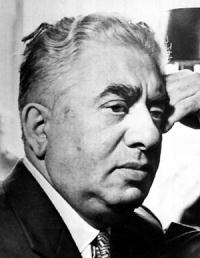
Aram Khachaturian (June 6, 1903–May 1, 1978) was a Soviet-Armenian composer whose works were often influenced by Armenian folk music.
Khachaturian’s works include concertos for violin (also transcribed for flute), cello, and piano (the latter originally including an early part for the flexatone), concerto-rhapsodies for the same instruments, three symphonies—the third containing parts for fifteen additional trumpets and organ, and the ballets Spartak (AKA Spartacus) and Gayane (the adagio was used in Stanley Kubrick’s film 2001: A Space Odyssey). The latter ballet features in its final act what is probably his most famous movement, the “Sabre Dance.” He also wrote some piano music such as the song "Two Ladies Gossiping," a quick and lively song.
He also composed some film music and incidental music for plays such as the 1941 production of Mikhail Lermontov’s Masquerade. The cinematic quality of his music for Spartacus was clearly seen when it was used as the theme for a popular BBC drama series, The Onedin Line, during the 1970s. Since then, it has become one of the most popular of all classical pieces for UK audiences. Joel Coen’s The Hudsucker Proxy also prominently featured music from Spartacus and Gayane (Sabre Dance included) mixed with the original compositions by Carter Burwell. He was also the composer for the state anthem of the Armenian SSR, whose tune is one of the five current choices to become the next state anthem of Armenia. The climax of Spartacus’ second movement was also used in Ice Age: The Meltdown.
Khachaturian’s works include concertos for violin (also transcribed for flute), cello, and piano (the latter originally including an early part for the flexatone), concerto-rhapsodies for the same instruments, three symphonies—the third containing parts for fifteen additional trumpets and organ, and the ballets Spartak (AKA Spartacus) and Gayane (the adagio was used in Stanley Kubrick’s film 2001: A Space Odyssey). The latter ballet features in its final act what is probably his most famous movement, the “Sabre Dance.” He also wrote some piano music such as the song "Two Ladies Gossiping," a quick and lively song.
He also composed some film music and incidental music for plays such as the 1941 production of Mikhail Lermontov’s Masquerade. The cinematic quality of his music for Spartacus was clearly seen when it was used as the theme for a popular BBC drama series, The Onedin Line, during the 1970s. Since then, it has become one of the most popular of all classical pieces for UK audiences. Joel Coen’s The Hudsucker Proxy also prominently featured music from Spartacus and Gayane (Sabre Dance included) mixed with the original compositions by Carter Burwell. He was also the composer for the state anthem of the Armenian SSR, whose tune is one of the five current choices to become the next state anthem of Armenia. The climax of Spartacus’ second movement was also used in Ice Age: The Meltdown.
Borodin

Alexander Porfiryevich Borodin (12 November 1833 – 27 February 1887) was a Russian Romantic composer and chemist of Georgian–Russian parentage. He was a member of the group of composers called The Five (or "The Mighty Handful"), who were dedicated to producing a specifically Russian kind of art music. He is best known for his symphonies, his two string quartets, and his opera Prince Igor. Music from Prince Igor and his string quartets was later adapted for the musical Kismet.
Eric Satie

Éric Alfred Leslie Satie (Honfleur, 17 May 1866 – Paris, 1 July 1925) was a French composer and pianist. Starting with his first composition in 1884, he signed his name as Erik Satie.
Satie was introduced as a "gymnopedist" in 1887, shortly before writing his most famous compositions, the Gymnopédies. Later, he also referred to himself as a "phonometrician" (meaning "someone who measures sounds") preferring this designation to that of "musician", after having been called "a clumsy but subtle technician" in a book on contemporary French composers published in 1911.
In addition to his body of music, Satie also left a remarkable set of writings, having contributed work for a range of publications, from the dadaist 391 to the American Vanity Fair. Although in later life he prided himself on always publishing his work under his own name, in the late nineteenth century he appears to have used pseudonyms such as Virginie Lebeau and François de Paule in some of his published writings.
Satie was a colourful figure in the early 20th century Parisian avant-garde. He was a precursor to later artistic movements such as minimalism, repetitive music, and the Theatre of the Absurd.
Satie was introduced as a "gymnopedist" in 1887, shortly before writing his most famous compositions, the Gymnopédies. Later, he also referred to himself as a "phonometrician" (meaning "someone who measures sounds") preferring this designation to that of "musician", after having been called "a clumsy but subtle technician" in a book on contemporary French composers published in 1911.
In addition to his body of music, Satie also left a remarkable set of writings, having contributed work for a range of publications, from the dadaist 391 to the American Vanity Fair. Although in later life he prided himself on always publishing his work under his own name, in the late nineteenth century he appears to have used pseudonyms such as Virginie Lebeau and François de Paule in some of his published writings.
Satie was a colourful figure in the early 20th century Parisian avant-garde. He was a precursor to later artistic movements such as minimalism, repetitive music, and the Theatre of the Absurd.
Ludovico Einaudi

Ludovico Einaudi (born 23 November 1955) is an Italian contemporary classical music composer and pianist.
Although Einaudi would prefer not to be labeled as any particular type of genre, he is sometimes referred to as Minimalist. This is despite his music not sharing the key musical properties associated with minimalism. This may be due to his music possessing sparse orchestration and simplistic melodies that some may wish to refer to as 'minimalist' despite not belonging to the musical movement of Minimalism.
Einaudi's own words on the matter reflect this viewpoint, with Einaudi referring to Minimalism as "elegance and openness", despite its more formal definition as a musical movement to which he arguably does not belong.
Although Einaudi would prefer not to be labeled as any particular type of genre, he is sometimes referred to as Minimalist. This is despite his music not sharing the key musical properties associated with minimalism. This may be due to his music possessing sparse orchestration and simplistic melodies that some may wish to refer to as 'minimalist' despite not belonging to the musical movement of Minimalism.
Einaudi's own words on the matter reflect this viewpoint, with Einaudi referring to Minimalism as "elegance and openness", despite its more formal definition as a musical movement to which he arguably does not belong.
Pink

Alecia Beth Moore (born on September 8, 1979), known professionally as Pink (often stylized as P!nk), is a two-time Grammy-winning American singer-songwriter who gained prominence in 2000.
Pink released her first record, the R&B-oriented Can't Take Me Home, in 2000 via LaFace Records. Her pop rock-based second studio album, M!ssundaztood, was released in 2001 and is her biggest seller to date. Her third album, 2003's Try This, failed to match the success of M!ssundaztood. After taking a break, Pink released her fourth studio album, I'm Not Dead (2006), which was successful worldwide. Pink has so far sold over 25 million albums worldwide. Her upcoming album, Funhouse, will be released in October 2008.
Pink released her first record, the R&B-oriented Can't Take Me Home, in 2000 via LaFace Records. Her pop rock-based second studio album, M!ssundaztood, was released in 2001 and is her biggest seller to date. Her third album, 2003's Try This, failed to match the success of M!ssundaztood. After taking a break, Pink released her fourth studio album, I'm Not Dead (2006), which was successful worldwide. Pink has so far sold over 25 million albums worldwide. Her upcoming album, Funhouse, will be released in October 2008.
Mikael Tariverdiev
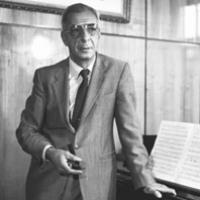
Mikael Tariverdiev (Russian: Микаэл Таривердиев; (15 August 1931, Tbilisi, Georgia - 24 June 1996, Sochi, Russia) was a prominent Soviet composer of Armenian descent. He headed the Composers' Guild of Soviet Cinematographers' Union from its inception.
He was born in Tbilisi, Georgian SSR to Armenian parents, but lived and worked in Russia. He graduated from Moscow Gnessin Institute (in the class of Aram Khachaturian).
He is an author of over 100 romances and 4 operas, including the comic opera Graf Cagliostro and monoopera "The Waiting". But he is best known for his music in many popular Soviet movies (more than 130 films, included "Seventeen Moments of Spring" and "The Irony of Fate" - see List of film music by Mikael Tariverdiev).
Mikael Tariverdiev was a recipient of many awards, including the USSR State Prize (1977) and the Prize of the American Music Academy (1975). He was awarded a title People's Artist of Russia in 1986. He won three Nika Awards for Best Composer in the 1990s.
The Best Music prize at the largest Russian National Film Festival Kinotaur is named after Tariverdiev. After the Tariverdiev's death a group of admirers of his music organized the Mikael Tariverdiev Charity Fund and Tariverdiev International Organ Competition.
He was born in Tbilisi, Georgian SSR to Armenian parents, but lived and worked in Russia. He graduated from Moscow Gnessin Institute (in the class of Aram Khachaturian).
He is an author of over 100 romances and 4 operas, including the comic opera Graf Cagliostro and monoopera "The Waiting". But he is best known for his music in many popular Soviet movies (more than 130 films, included "Seventeen Moments of Spring" and "The Irony of Fate" - see List of film music by Mikael Tariverdiev).
Mikael Tariverdiev was a recipient of many awards, including the USSR State Prize (1977) and the Prize of the American Music Academy (1975). He was awarded a title People's Artist of Russia in 1986. He won three Nika Awards for Best Composer in the 1990s.
The Best Music prize at the largest Russian National Film Festival Kinotaur is named after Tariverdiev. After the Tariverdiev's death a group of admirers of his music organized the Mikael Tariverdiev Charity Fund and Tariverdiev International Organ Competition.
Miles Davis

Miles Dewey Davis III (May 26, 1926 – September 28, 1991) was an American trumpeter, bandleader, and composer.
Widely considered one of the most influential musicians of the 20th century, Miles Davis was, with his musical groups, at the forefront of several major developments in jazz music, including bebop, cool jazz, hard bop, modal jazz, and jazz fusion. Many well-known musicians rose to prominence as members of Davis' ensembles, including saxophonists Gerry Mulligan, John Coltrane, Cannonball Adderley, George Coleman, Wayne Shorter, Dave Liebman, Branford Marsalis and Kenny Garrett; trombonist J. J. Johnson; pianists Horace Silver, Red Garland, Wynton Kelly, Bill Evans, Herbie Hancock, Joe Zawinul, Chick Corea, and Keith Jarrett; guitarists John McLaughlin, Pete Cosey, John Scofield and Mike Stern; bassists Paul Chambers, Ron Carter, Dave Holland, Marcus Miller and Darryl Jones ; and drummers Philly Joe Jones, Jimmy Cobb, Tony Williams, Billy Cobham, Jack DeJohnette, and Al Foster.
On October 7, 2008, his album Kind of Blue, released in 1959, received its fourth platinum certification from the RIAA, signifying sales of 4 million copies. Miles Davis was inducted into the Rock and Roll Hall of Fame in 2006. Davis was noted as "one of the key figures in the history of jazz".
On November 5, 2009, Rep. John Conyers of Michigan sponsored a measure in the US House of Representatives to recognize and commemorate the album Kind of Blue on its 50th anniversary. The measure also affirms jazz as a national treasure and "encourages the United States government to preserve and advance the art form of jazz music." It passed, unanimously, with a vote of 409–0 on December 15, 2009.
Widely considered one of the most influential musicians of the 20th century, Miles Davis was, with his musical groups, at the forefront of several major developments in jazz music, including bebop, cool jazz, hard bop, modal jazz, and jazz fusion. Many well-known musicians rose to prominence as members of Davis' ensembles, including saxophonists Gerry Mulligan, John Coltrane, Cannonball Adderley, George Coleman, Wayne Shorter, Dave Liebman, Branford Marsalis and Kenny Garrett; trombonist J. J. Johnson; pianists Horace Silver, Red Garland, Wynton Kelly, Bill Evans, Herbie Hancock, Joe Zawinul, Chick Corea, and Keith Jarrett; guitarists John McLaughlin, Pete Cosey, John Scofield and Mike Stern; bassists Paul Chambers, Ron Carter, Dave Holland, Marcus Miller and Darryl Jones ; and drummers Philly Joe Jones, Jimmy Cobb, Tony Williams, Billy Cobham, Jack DeJohnette, and Al Foster.
On October 7, 2008, his album Kind of Blue, released in 1959, received its fourth platinum certification from the RIAA, signifying sales of 4 million copies. Miles Davis was inducted into the Rock and Roll Hall of Fame in 2006. Davis was noted as "one of the key figures in the history of jazz".
On November 5, 2009, Rep. John Conyers of Michigan sponsored a measure in the US House of Representatives to recognize and commemorate the album Kind of Blue on its 50th anniversary. The measure also affirms jazz as a national treasure and "encourages the United States government to preserve and advance the art form of jazz music." It passed, unanimously, with a vote of 409–0 on December 15, 2009.
John Dowland
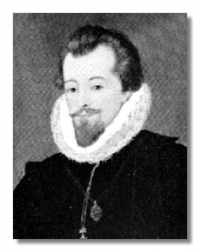
John Dowland (1563 – buried 20 February 1626) was an English composer, singer, and lutenist. He is best known today for his melancholy songs such as "Come, heavy sleep" (the basis for Benjamin Britten's Nocturnal), "Come again", "Flow my tears", "I saw my Lady weepe" and "In darkness let me dwell", but his instrumental music has undergone a major revival, and has been a source of repertoire for classical guitarists during the twentieth century.
Bach

Johann Sebastian Bach (31 March 1685 – 28 July 1750) was a German composer and organist whose sacred and secular works for choir, orchestra, and solo instruments drew together the strands of the Baroque period and brought it to its ultimate maturity. Although he introduced no new forms, he enriched the prevailing German style with a robust contrapuntal technique, an unrivalled control of harmonic and motivic organisation in composition for diverse musical forces, and the adaptation of rhythms and textures from abroad, particularly Italy and France.
Revered for their intellectual depth and technical and artistic beauty, Bach's works include the Brandenburg concertos; the Goldberg Variations; the English Suites, French Suites, Partitas, and Well-Tempered Clavier; the Mass in B Minor; the St. Matthew Passion; the St. John Passion; The Musical Offering; The Art of Fugue; the Sonatas and Partitas for violin solo; the Cello Suites; more than 200 surviving cantatas; and a similar number of organ works, including the celebrated Toccata and Fugue in D Minor.
While Bach's fame as an organist was great during his lifetime, he was not particularly well-known as a composer. His adherence to Baroque forms and contrapuntal style was considered "old-fashioned" by his contemporaries, especially late in his career when the musical fashion tended towards Rococo and later Classical styles. A revival of interest and performances of his music began early in the 19th century, and he is now widely considered to be one of the greatest composers in the Western tradition.
Revered for their intellectual depth and technical and artistic beauty, Bach's works include the Brandenburg concertos; the Goldberg Variations; the English Suites, French Suites, Partitas, and Well-Tempered Clavier; the Mass in B Minor; the St. Matthew Passion; the St. John Passion; The Musical Offering; The Art of Fugue; the Sonatas and Partitas for violin solo; the Cello Suites; more than 200 surviving cantatas; and a similar number of organ works, including the celebrated Toccata and Fugue in D Minor.
While Bach's fame as an organist was great during his lifetime, he was not particularly well-known as a composer. His adherence to Baroque forms and contrapuntal style was considered "old-fashioned" by his contemporaries, especially late in his career when the musical fashion tended towards Rococo and later Classical styles. A revival of interest and performances of his music began early in the 19th century, and he is now widely considered to be one of the greatest composers in the Western tradition.
Genesis
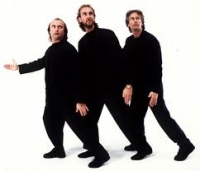
Genesis are an English rock band that formed in 1967. The band currently comprises the longest-tenured members Phil Collins, Mike Rutherford and Tony Banks. Past members Peter Gabriel, Anthony Phillips and Steve Hackett also played major roles in the band in its early years. Genesis are among the top 30 highest-selling recording artists of all time with approximately 150 million albums sold worldwide.
Nobuo Uematsu

Nobuo Uematsu (植松伸夫 Uematsu Nobuo?, born March 21, 1959) is a Japanese video game composer and musician, best known for scoring the majority of titles in the Final Fantasy series. He is regarded as one of the most famous and respected composers in the video game community. Uematsu is a self-taught musician; he began to play the piano at the age of eleven or twelve, with Elton John as his biggest influence.
Uematsu joined Square (later Square Enix) in 1985, where he met Final Fantasy creator Hironobu Sakaguchi. They have worked together on numerous titles, most notably the games in the Final Fantasy series. After nearly 20 years in the company, he left Square Enix in 2004 and founded his own company called Smile Please, as well as the music production company Dog Ear Records. He has since composed music as a freelancer for video games primarily developed by Square Enix and Sakaguchi's development studio Mistwalker.
A handful of soundtracks and arranged albums of Uematsu's game scores have been released. Pieces from his video game works have been performed in concerts worldwide, and numerous Final Fantasy concerts have also been held. He has worked with Grammy Award-winning conductor Arnie Roth on several of these concerts. In 2002, he formed a rock band with colleagues Kenichiro Fukui and Tsuyoshi Sekito called The Black Mages, in which Uematsu plays the keyboard. The band plays arranged rock versions of Uematsu's Final Fantasy compositions.
Uematsu joined Square (later Square Enix) in 1985, where he met Final Fantasy creator Hironobu Sakaguchi. They have worked together on numerous titles, most notably the games in the Final Fantasy series. After nearly 20 years in the company, he left Square Enix in 2004 and founded his own company called Smile Please, as well as the music production company Dog Ear Records. He has since composed music as a freelancer for video games primarily developed by Square Enix and Sakaguchi's development studio Mistwalker.
A handful of soundtracks and arranged albums of Uematsu's game scores have been released. Pieces from his video game works have been performed in concerts worldwide, and numerous Final Fantasy concerts have also been held. He has worked with Grammy Award-winning conductor Arnie Roth on several of these concerts. In 2002, he formed a rock band with colleagues Kenichiro Fukui and Tsuyoshi Sekito called The Black Mages, in which Uematsu plays the keyboard. The band plays arranged rock versions of Uematsu's Final Fantasy compositions.
Edvard Grieg

Edvard Hagerup Grieg (15 June 1843 – 4 September 1907) was a Norwegian composer and pianist who composed in the Romantic period. He is best known for his Piano Concerto in A minor, for his incidental music to Henrik Ibsen's play Peer Gynt (which includes Morning Mood and In the Hall of the Mountain King), and for his collection of piano miniatures Lyric Pieces. "Edvard" is sometimes mispelt as "Edward".
Grieg is renowned as a nationalist composer, drawing inspiration from Norwegian folk music. Early works include a symphony (which he later suppressed) and a piano sonata. He also wrote three sonatas for violin and piano and a cello sonata. His many short pieces for piano — often based on Norwegian folk tunes and dances — led some to call him the "Chopin of the North".
Concerto in A minor: 1. Allegro molto moderato
Performed by the University of Washington Symphony, conducted by Peter Erős (Neal O'Doan, piano)
Concerto in A minor: 1. Allegro molto moderato
Performed by the Skidmore College Orchestra (courtesy of Musopen)
Concerto in A minor: 2. Adagio
Performed by the University of Washington Symphony, conducted by Peter Erős (Neal O'Doan, piano)
Concerto in A minor: 2. Adagio
Performed by the Skidmore College Orchestra (courtesy of Musopen)
Concerto in A minor: 3. Allegro moderato molto e marcato
Performed by the University of Washington Symphony, conducted by Peter Erős (Neal O'Doan, piano)
Concerto in A minor: 3. Allegro moderato molto e marcato
Performed by the Skidmore College Orchestra (courtesy of Musopen)
Notturno, Op. 54, No. 4
Performed live by Mark Gasser
Problems listening to these files? See media help.
The Piano Concerto is his most popular work. Its champions have included the pianist and composer Percy Grainger, a personal friend of Grieg who played the concerto frequently during his long career. An arrangement of part of the work made an iconic television comedy appearance in the 1971 Morecambe and Wise Show, conducted by André Previn.
Some of the Lyric Pieces (for piano) are also well-known, as is the incidental music to Henrik Ibsen's play Peer Gynt, a play that Grieg found to be an arduous work to score properly. In a 1874 letter to his friend Frants Beyer, Grieg expressed his unhappiness with what is now considered one of his most popular compositions from Peer Gynt, In the Hall of the Mountain King: "I have also written something for the scene in the hall of the mountain King - something that I literally can't bear listening to because it absolutely reeks of cow-pies, exaggerated Norwegian nationalism, and trollish self-satisfaction! But I have a hunch that the irony will be discernible."
Grieg is renowned as a nationalist composer, drawing inspiration from Norwegian folk music. Early works include a symphony (which he later suppressed) and a piano sonata. He also wrote three sonatas for violin and piano and a cello sonata. His many short pieces for piano — often based on Norwegian folk tunes and dances — led some to call him the "Chopin of the North".
Concerto in A minor: 1. Allegro molto moderato
Performed by the University of Washington Symphony, conducted by Peter Erős (Neal O'Doan, piano)
Concerto in A minor: 1. Allegro molto moderato
Performed by the Skidmore College Orchestra (courtesy of Musopen)
Concerto in A minor: 2. Adagio
Performed by the University of Washington Symphony, conducted by Peter Erős (Neal O'Doan, piano)
Concerto in A minor: 2. Adagio
Performed by the Skidmore College Orchestra (courtesy of Musopen)
Concerto in A minor: 3. Allegro moderato molto e marcato
Performed by the University of Washington Symphony, conducted by Peter Erős (Neal O'Doan, piano)
Concerto in A minor: 3. Allegro moderato molto e marcato
Performed by the Skidmore College Orchestra (courtesy of Musopen)
Notturno, Op. 54, No. 4
Performed live by Mark Gasser
Problems listening to these files? See media help.
The Piano Concerto is his most popular work. Its champions have included the pianist and composer Percy Grainger, a personal friend of Grieg who played the concerto frequently during his long career. An arrangement of part of the work made an iconic television comedy appearance in the 1971 Morecambe and Wise Show, conducted by André Previn.
Some of the Lyric Pieces (for piano) are also well-known, as is the incidental music to Henrik Ibsen's play Peer Gynt, a play that Grieg found to be an arduous work to score properly. In a 1874 letter to his friend Frants Beyer, Grieg expressed his unhappiness with what is now considered one of his most popular compositions from Peer Gynt, In the Hall of the Mountain King: "I have also written something for the scene in the hall of the mountain King - something that I literally can't bear listening to because it absolutely reeks of cow-pies, exaggerated Norwegian nationalism, and trollish self-satisfaction! But I have a hunch that the irony will be discernible."
Lara Fabian

Lara Fabian (born Lara Crokaert, January 9, 1970) is a Belgian-Italian international singer who holds Canadian citizenship. Multilingual, she sings in French, Italian and English. She has also sung in Spanish, Portuguese, Russian once in Hebrew on Israel's 60th Independence Day celebrations, and in German in 1988 for a version of "Croire" (ger.: "glauben" eng.: "believe"). She has sold over 18 million records worldwide.
The Pussycat Dolls

Pussycat Dolls (abbreviated to PCD) are an American girl group and dance ensemble founded by choreographer Robin Antin in 1995 as a burlesque troupe based in Los Angeles. After attracting national attention, Antin eventually negotiated a record deal with Interscope Records in 2003 turning the group into a music franchise, comprising Nicole Scherzinger alongside Carmit Bachar, Melody Thornton, Jessica Sutta, Ashley Roberts and Kimberly Wyatt. Since then the group has developed a global image and commercial brand overseen by Antin, Interscope and various partners. They have diversified into reality television programs, a Las Vegas act and product endorsements amongst other things.
Success as a music group came in 2005 with their first album PCD which debuted at number five in the US producing three successful singles "Don't Cha", "Buttons", and "Stickwitu"; the latter earned the group a Grammy Award nomination. Following the departure of Carmit Bachar in February 2008, the group continued as a quintet and in September of that year they released their second album, Doll Domination, spawning singles "When I Grow Up", "I Hate This Part" and "Jai Ho! (You Are My Destiny)".
Success as a music group came in 2005 with their first album PCD which debuted at number five in the US producing three successful singles "Don't Cha", "Buttons", and "Stickwitu"; the latter earned the group a Grammy Award nomination. Following the departure of Carmit Bachar in February 2008, the group continued as a quintet and in September of that year they released their second album, Doll Domination, spawning singles "When I Grow Up", "I Hate This Part" and "Jai Ho! (You Are My Destiny)".
The Nightmare Before Christmas
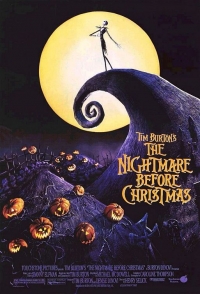
Tim Burton's The Nightmare Before Christmas is a 1993 animated musical film written and produced by Tim Burton, directed by Henry Selick and scored by Danny Elfman. The film was based on Burton's characters and original story.
The film was a critical and commercial success, with particular praise awarded for Tim Burton's original storyline and stop motion animation, combined with Danny Elfman's creative musical score. Following its theatrical, and home video release, the film has earned a significant following, including merchandise, video games and other related media dedicated to the film. The film has also been theatrically re-released on several occasions, including two remastered 3-D versions released in Disney Digital 3-D on October 20, 2006,October 19, 2007 and will make a 3rd re-release on October 24th, 2008. It is rated PG for "some scary images" by the MPAA. Disney CEO, Michael Eisner, commented that the film was "too dark for children"], therefore it would be decided that Disney release the film under Touchstone Pictures. However, the 2006 3-D version of the film was released under the Walt Disney banner and the Special Edition DVD is also released under the Walt Disney banner.
The Nightmare Before Christmas is the 1993 soundtrack to the film of the same name. Composed by Danny Elfman, the soundtrack was nominated for the 1993 Golden Globe for best original score.
For the film's 2006 re-release in Disney Digital 3-D, a 2-disc special edition of the soundtrack was released, featuring covers of several of the film's songs by Fall Out Boy, Panic! at the Disco, Marilyn Manson, Fiona Apple, and She Wants Revenge. Six original demo tracks by Elfman are also included.
The film was a critical and commercial success, with particular praise awarded for Tim Burton's original storyline and stop motion animation, combined with Danny Elfman's creative musical score. Following its theatrical, and home video release, the film has earned a significant following, including merchandise, video games and other related media dedicated to the film. The film has also been theatrically re-released on several occasions, including two remastered 3-D versions released in Disney Digital 3-D on October 20, 2006,October 19, 2007 and will make a 3rd re-release on October 24th, 2008. It is rated PG for "some scary images" by the MPAA. Disney CEO, Michael Eisner, commented that the film was "too dark for children"], therefore it would be decided that Disney release the film under Touchstone Pictures. However, the 2006 3-D version of the film was released under the Walt Disney banner and the Special Edition DVD is also released under the Walt Disney banner.
The Nightmare Before Christmas is the 1993 soundtrack to the film of the same name. Composed by Danny Elfman, the soundtrack was nominated for the 1993 Golden Globe for best original score.
For the film's 2006 re-release in Disney Digital 3-D, a 2-disc special edition of the soundtrack was released, featuring covers of several of the film's songs by Fall Out Boy, Panic! at the Disco, Marilyn Manson, Fiona Apple, and She Wants Revenge. Six original demo tracks by Elfman are also included.
Josh Groban

Joshua Winslow Groban (born February 27, 1981) is a Grammy-nominated American singer-songwriter. He has concentrated his career so far mostly in concert singing and recordings, although he has stated that he wishes to pursue musical theater in the future.
Various music critics have described Groban's voice in different ways, with some referring to him as a tenor and others as a baritone. In performance, Groban's music goes as low as G2 (as in the song "To Where You Are") and extends up to at least B4 flat or the B flat above middle C (as heard in "You Raise Me Up"). He also hits a High B during the Baywatch theme song in his Emmy performance of TV Theme Songs on September 21, 2008.This places his voice lower than the tenor range on the low end, and just short of Tenor C, and therefore above the baritone range, on the high end.
Some of Groban's musical influences have been Radiohead, Paul Simon, Sting, Peter Gabriel, and Björk. He says he is able to look up to anyone, musically, who has pushed the boundaries and stepped outside of the box. As for vocal influences, "anyone who told a story with their songs," including Mandy Patinkin, Klaus Nomi, George Hearn, and Luciano Pavarotti.
Various music critics have described Groban's voice in different ways, with some referring to him as a tenor and others as a baritone. In performance, Groban's music goes as low as G2 (as in the song "To Where You Are") and extends up to at least B4 flat or the B flat above middle C (as heard in "You Raise Me Up"). He also hits a High B during the Baywatch theme song in his Emmy performance of TV Theme Songs on September 21, 2008.This places his voice lower than the tenor range on the low end, and just short of Tenor C, and therefore above the baritone range, on the high end.
Some of Groban's musical influences have been Radiohead, Paul Simon, Sting, Peter Gabriel, and Björk. He says he is able to look up to anyone, musically, who has pushed the boundaries and stepped outside of the box. As for vocal influences, "anyone who told a story with their songs," including Mandy Patinkin, Klaus Nomi, George Hearn, and Luciano Pavarotti.
Nicanor Abelardo
Nicanor Sta. Ana Abelardo (February 7, 1893 – March 21, 1934) was a Filipino composer who composed over a hundred of Kundiman songs, especially before the Second World War.
Sara Bareilles

Sara Beth Bareilles (born December 7, 1979) is an American singer-songwriter and pianist. She achieved mainstream success in 2007 with the hit single "Love Song", which brought her into the number one spot on the Billboard Pop 100 chart.
After graduating from college in 2002, Bareilles performed at local bars and clubs (such as the Hotel Cafe and Genghis Cohen in Los Angeles), building a following, before performing in larger venues. She issued two demos of mostly live tracks in 2003: The First One in April and The Summer Sessions in October. In 2004, she appeared as a singer in a bar in the indie film Girl Play, performing the song "Undertow".
In January 2004, Bareilles released her first studio album, Careful Confessions. She signed a contract with Epic Records' A&R executive Pete Giberga on April 15, 2005. The remainder of the year and early 2006 were spent writing and reworking songs for her upcoming album. Her song, "Gravity," appears briefly in the 2006 independent film Loving Annabelle. She also toured as the opening act in 2006 for Marc Broussard's "Carencro" tour.
In mid-2004 she opened for Rocco DeLuca and the Burden during their inaugural headline tour, supported Guster on their first UK tour and co-headlined a tour with Jon McLaughlin. In 2007, Bareilles toured as the opening act for Aqualung and Mika, and later that year opened for several shows on both Maroon 5 and Paolo Nutini's U.S. tours. She also opened for James Blunt on his U.S. Tour in association with VH1 You Oughta Know.
After graduating from college in 2002, Bareilles performed at local bars and clubs (such as the Hotel Cafe and Genghis Cohen in Los Angeles), building a following, before performing in larger venues. She issued two demos of mostly live tracks in 2003: The First One in April and The Summer Sessions in October. In 2004, she appeared as a singer in a bar in the indie film Girl Play, performing the song "Undertow".
In January 2004, Bareilles released her first studio album, Careful Confessions. She signed a contract with Epic Records' A&R executive Pete Giberga on April 15, 2005. The remainder of the year and early 2006 were spent writing and reworking songs for her upcoming album. Her song, "Gravity," appears briefly in the 2006 independent film Loving Annabelle. She also toured as the opening act in 2006 for Marc Broussard's "Carencro" tour.
In mid-2004 she opened for Rocco DeLuca and the Burden during their inaugural headline tour, supported Guster on their first UK tour and co-headlined a tour with Jon McLaughlin. In 2007, Bareilles toured as the opening act for Aqualung and Mika, and later that year opened for several shows on both Maroon 5 and Paolo Nutini's U.S. tours. She also opened for James Blunt on his U.S. Tour in association with VH1 You Oughta Know.
Cinderella
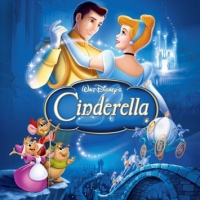
Cinderella is a 1950 animated feature produced by Walt Disney, and released to theaters on February 15, 1950 by RKO Radio Pictures. The twelfth animated feature in the Disney animated features canon, the film was directed by Clyde Geronimi, Hamilton Luske and Wilfred Jackson, based the fairy tale "Cinderella" by Charles Perrault. Songs were written by Mack David, Jerry Livingston, and Al Hoffman. Songs in the film include "A Dream Is a Wish Your Heart Makes", "Bibbidi-Bobbidi-Boo", "So This Is Love", "Sing Sweet Nightingale", "The Work Song", and "Cinderella."
The film received three Academy Award nominations for Best Sound, Original Music Score and Best Song for "Bibbidi-Bobbidi-Boo".
The film received three Academy Award nominations for Best Sound, Original Music Score and Best Song for "Bibbidi-Bobbidi-Boo".
Jamey Aebersold

Jamey Aebersold (born July 21, 1939 in New Albany, Indiana) is an American jazz saxophonist and music educator. His "Play-A-Long" series of instructional book and CD collections, using the chord-scale system, the first of which was released in 1967, are an internationally renowned resource for jazz education. As of 2009, 126 of these collections have been published by Aebersold, who currently teaches musical improvisation at the University of Louisville. He is also an adept pianist, bassist, and banjoist.
Yann Tiersen

Guillaume Yann Tiersen (born 23 June 1970) is a French musician and composer known internationally for composing the score to the Jean-Pierre Jeunet movie Amélie. His music is recognized by its use of a large variety of instruments in relatively minimalist compositions, often with a touch of either European classical music or French folk music, using primarily the piano, accordion or violin together with instruments like the melodica, xylophone, toy piano, ondes martenot, harpsichord and typewriter. His musical style is reminiscent of Frédéric Chopin, Erik Satie, Philip Glass and Michael Nyman.
Astor Piazzolla

Ástor Pantaleón Piazzolla (March 11, 1921 – July 4, 1992) was an Argentine tango composer and bandoneón player. His oeuvre revolutionized the traditional tango into a new style termed nuevo tango, incorporating elements from jazz and classical music. An excellent bandoneonist, he regularly performed his own compositions with different ensembles.
Piazzolla's nuevo tango was distinct from the traditional tango in its incorporation of elements of jazz, its use of extended harmonies and dissonance, its use of counterpoint, and its ventures into extended compositional forms. As Argentine psychoanalyst Carlos Kuri has pointed out, Piazzolla's fusion of tango with this wide range of other recognizable Western musical elements was so successful that it produced a new individual style transcending these influences. It is precisely this success, and individuality, that makes it hard to pin down where particular influences reside in his compositions, but some aspects are clear. The use of the passacaglia technique of a circulating bass line and harmonic sequence, invented and much used in 17th and 18th century baroque music but also central to the idea of jazz "changes", predominates in most of Piazzolla's mature compositions. Another clear reference to the baroque is the often complex and virtuosic counterpoint that sometimes follows strict fugal behavior but more often simply allows each performer in the group to assert his voice. A further technique that emphasises this sense of democracy and freedom among the musicians is improvisation that is borrowed from jazz in concept, but in practice involves a different vocabulary of scales and rhythms that stay within the parameters of the established tango sound-world. Pablo Ziegler has been particularly responsible for developing this aspect of the style both within Piazzolla's groups and since the composer's death.
Piazzolla's nuevo tango was distinct from the traditional tango in its incorporation of elements of jazz, its use of extended harmonies and dissonance, its use of counterpoint, and its ventures into extended compositional forms. As Argentine psychoanalyst Carlos Kuri has pointed out, Piazzolla's fusion of tango with this wide range of other recognizable Western musical elements was so successful that it produced a new individual style transcending these influences. It is precisely this success, and individuality, that makes it hard to pin down where particular influences reside in his compositions, but some aspects are clear. The use of the passacaglia technique of a circulating bass line and harmonic sequence, invented and much used in 17th and 18th century baroque music but also central to the idea of jazz "changes", predominates in most of Piazzolla's mature compositions. Another clear reference to the baroque is the often complex and virtuosic counterpoint that sometimes follows strict fugal behavior but more often simply allows each performer in the group to assert his voice. A further technique that emphasises this sense of democracy and freedom among the musicians is improvisation that is borrowed from jazz in concept, but in practice involves a different vocabulary of scales and rhythms that stay within the parameters of the established tango sound-world. Pablo Ziegler has been particularly responsible for developing this aspect of the style both within Piazzolla's groups and since the composer's death.
Felix Mendelssohn

Jakob Ludwig Felix Mendelssohn Bartholdy, born, and generally known in English-speaking countries, as Felix Mendelssohn (February 3, 1809 – November 4, 1847) was a German composer, pianist, organist and conductor of the early Romantic period.
The grandson of the philosopher Moses Mendelssohn, he was born into a notable Jewish family, although he himself was brought up initially without religion, and later as a Lutheran. He was recognized early as a musical prodigy, but his parents were cautious and did not seek to capitalise on his abilities. Indeed his father was disinclined to allow Felix to follow a musical career until it became clear that he intended to seriously dedicate himself to it.
Early success in Germany was followed by travel throughout Europe; Mendelssohn was particularly well received in England as a composer, conductor and soloist, and his ten visits there, during which many of his major works were premiered, form an important part of his adult career. His essentially conservative musical tastes however set him apart from many of his more adventurous musical contemporaries such as Liszt, Wagner and Berlioz. The Conservatory he founded at Leipzig became a bastion of this anti-radical outlook.
Mendelssohn's work includes symphonies, concerti, oratorios, piano and chamber music. He also had an important role in the revival of interest in the music of Johann Sebastian Bach. After a long period of relative denigration due to changing musical tastes and antisemitism in the late 19th and early 20th centuries, his creative originality is now being recognized and re-evaluated. He is now among the most popular composers of the Romantic era.
The grandson of the philosopher Moses Mendelssohn, he was born into a notable Jewish family, although he himself was brought up initially without religion, and later as a Lutheran. He was recognized early as a musical prodigy, but his parents were cautious and did not seek to capitalise on his abilities. Indeed his father was disinclined to allow Felix to follow a musical career until it became clear that he intended to seriously dedicate himself to it.
Early success in Germany was followed by travel throughout Europe; Mendelssohn was particularly well received in England as a composer, conductor and soloist, and his ten visits there, during which many of his major works were premiered, form an important part of his adult career. His essentially conservative musical tastes however set him apart from many of his more adventurous musical contemporaries such as Liszt, Wagner and Berlioz. The Conservatory he founded at Leipzig became a bastion of this anti-radical outlook.
Mendelssohn's work includes symphonies, concerti, oratorios, piano and chamber music. He also had an important role in the revival of interest in the music of Johann Sebastian Bach. After a long period of relative denigration due to changing musical tastes and antisemitism in the late 19th and early 20th centuries, his creative originality is now being recognized and re-evaluated. He is now among the most popular composers of the Romantic era.
Bruni
Antonio Bartolomeo Bruni (January 28, 1757 – August 6, 1821) was an Italian violinist, composer and conductor. Bruni was born and died in Cuneo, Italy. During most of his life he resided, played and composed in Paris.
Tom Kitt
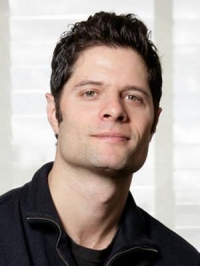
Thomas Robert "Tom" Kitt (born 1974) is an American composer, conductor, orchestrator and musician. For his score for the musical Next to Normal, he shared the 2010 Pulitzer Prize for Drama with Brian Yorkey. He also won the Tony Award and 2008 Outer Critics Circle Award, and was nominated for a Drama Desk Award for American Idiot and Everyday Rapture.
Edges

Edges (sometimes produced as Edges: A Song Cycle) is a work of musical theatre by Benj Pasek and Justin Paul. It is a song cycle about coming of age, growth and self-discovery of people mostly in their 20s. Its most famous song, "Be My Friend", has come to be commonly known as the "Facebook song".
Final Fantasy VIII

Final Fantasy VIII (ファイナルファンタジーVIII Fainaru Fantajī Eito) is a role-playing video game developed and published by Square for the PlayStation console. Released in 1999, it is the eighth main installment in the Final Fantasy series. Set on an unnamed fantasy world with science fiction elements, the game follows a group of young mercenaries, led by Squall Leonhart, as they are drawn into a conflict sparked by the sorceress Edea. After defeating Edea, the protagonists learn that she was under the control of Ultimecia, a sorceress from the future who wishes to compress time. During the quest to defeat Ultimecia, Squall struggles with his role as leader and develops a romance with one of his comrades, Rinoa Heartilly.
Development began in 1997, during the English localization of Final Fantasy VII. The game builds on the visual changes brought to the series by Final Fantasy VII, including use 3D graphics and pre-rendered backgrounds, while also departing from many Final Fantasy traditions. It is the first Final Fantasy to use realistically proportioned characters consistently, feature a vocal piece as its theme music, forego the use of magic points for spellcasting, and deviate from the series' traditional means of increasing a character's power.
Final Fantasy VIII was mostly well received by critics, who praised its originality and visuals while criticizing some of its gameplay elements. It was voted the 22nd-best game of all time in 2006 by readers of the Japanese magazine Famitsu. The game was a commercial success; 13 weeks after its release, Final Fantasy VIII had earned more than US$50 million in sales, making it the fastest-selling Final Fantasy title until Final Fantasy XIII, a multi-platform release. It was later ported to Windows-based personal computers and became available on PlayStation Network as a PSone Classics title in 2009. As of December 2013, it has sold more than 8.5 million copies worldwide.
Development began in 1997, during the English localization of Final Fantasy VII. The game builds on the visual changes brought to the series by Final Fantasy VII, including use 3D graphics and pre-rendered backgrounds, while also departing from many Final Fantasy traditions. It is the first Final Fantasy to use realistically proportioned characters consistently, feature a vocal piece as its theme music, forego the use of magic points for spellcasting, and deviate from the series' traditional means of increasing a character's power.
Final Fantasy VIII was mostly well received by critics, who praised its originality and visuals while criticizing some of its gameplay elements. It was voted the 22nd-best game of all time in 2006 by readers of the Japanese magazine Famitsu. The game was a commercial success; 13 weeks after its release, Final Fantasy VIII had earned more than US$50 million in sales, making it the fastest-selling Final Fantasy title until Final Fantasy XIII, a multi-platform release. It was later ported to Windows-based personal computers and became available on PlayStation Network as a PSone Classics title in 2009. As of December 2013, it has sold more than 8.5 million copies worldwide.
Rachmaninoff

Sergei Vasilievich Rachmaninoff (1 April 1873 - 28 March 1943) was a Russian composer, pianist, and conductor. He was one of the finest pianists of his day and, as a composer, the last great representative of Russian late Romanticism in classical music. Early influences of Tchaikovsky, Rimsky-Korsakov and other Russian composers gave way to a thoroughly personal idiom which included a pronounced lyricism, expressive breadth, structural ingenuity and a tonal palette of rich, distinctive orchestral colors.
Understandably, the piano figures prominently in Rachmaninoff's compositional output, either as a solo instrument or as part of an ensemble. He made it a point, however, to use his own skills as a performer to explore fully the expressive possibilities of the instrument. Even in his earliest works, he revealed a sure grasp of idiomatic piano writing and a striking gift for melody. In some of his early orchestral pieces he showed the first signs of a talent for tone painting, which he would perfect in The Isle of the Dead, and he began to show a similar penchant for vocal writing in two early sets of songs, Opp. 4 and 8. Rachmaninoff's masterpiece, however, is his choral symphony The Bells, in which all of his talents are fused and unified.
Rachmaninoff sometimes felt threatened by the success of modernists such as Scriabin and Prokofiev and wondered whether to cease composing even before he left Russia. His musical philosophy was rooted in the Russian spiritual tradition, where the role of the artist was to create beauty and to speak the truth from the depths of his heart. In his last major interview, in 1941, he admitted his music, like Russian music, was a product of his temperament. He said, on another occasion, "The new kind of music seems to create not from the heart but from the head. Its composers think rather than feel. They have not the capacity to make their works exalt—they meditate, protest, analyze, reason, calculate and brood, but they do not exalt."
Understandably, the piano figures prominently in Rachmaninoff's compositional output, either as a solo instrument or as part of an ensemble. He made it a point, however, to use his own skills as a performer to explore fully the expressive possibilities of the instrument. Even in his earliest works, he revealed a sure grasp of idiomatic piano writing and a striking gift for melody. In some of his early orchestral pieces he showed the first signs of a talent for tone painting, which he would perfect in The Isle of the Dead, and he began to show a similar penchant for vocal writing in two early sets of songs, Opp. 4 and 8. Rachmaninoff's masterpiece, however, is his choral symphony The Bells, in which all of his talents are fused and unified.
Rachmaninoff sometimes felt threatened by the success of modernists such as Scriabin and Prokofiev and wondered whether to cease composing even before he left Russia. His musical philosophy was rooted in the Russian spiritual tradition, where the role of the artist was to create beauty and to speak the truth from the depths of his heart. In his last major interview, in 1941, he admitted his music, like Russian music, was a product of his temperament. He said, on another occasion, "The new kind of music seems to create not from the heart but from the head. Its composers think rather than feel. They have not the capacity to make their works exalt—they meditate, protest, analyze, reason, calculate and brood, but they do not exalt."
The Drowsy Chaperone
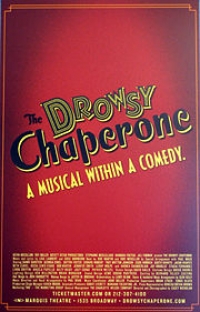
The Drowsy Chaperone is a musical with a book by Bob Martin and Don McKellar and music and lyrics by Lisa Lambert and Greg Morrison. It debuted in 2001 at the Toronto Fringe Festival and opened on Broadway on May 1, 2006.
 Sheet Music Max is a site for those who wants to access popular sheet music easily,
letting them download the sheet music for free for trial purposes.
It's completely free to download and try the listed sheet music, but you have to delete the files after 24 hours of trial.
Don't forget, if you like the piece of music you have just learned playing,
treat the artist with respect, and go buy the original sheet music.
Sheet Music Max is a site for those who wants to access popular sheet music easily,
letting them download the sheet music for free for trial purposes.
It's completely free to download and try the listed sheet music, but you have to delete the files after 24 hours of trial.
Don't forget, if you like the piece of music you have just learned playing,
treat the artist with respect, and go buy the original sheet music.